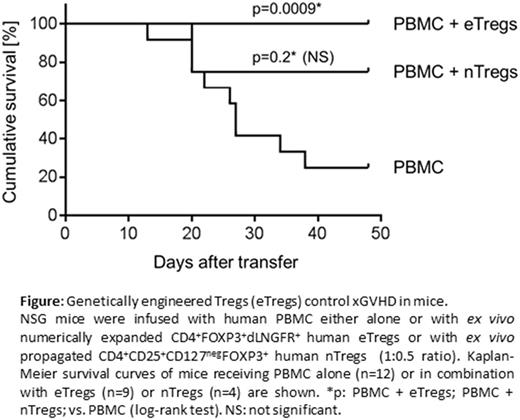Abstract
Graft-versus-host-disease (GVHD) undermines survival and complicates survivorship of recipients of allogeneic hematopoietic stem-cell transplantation (HSCT). Adoptive transfer of natural T regulatory cells (nTregs) expressing the lineage-specific transcription factor FOXP3 has been successfully used to prevent or treat GVHD in humans and mice. However, human applications of propagated nTregs have been hampered by the need for extensive ex vivo expansion to obtain sufficient numbers. Furthermore, such nTregs could lose expression of FOXP3 compromising their suppressive function after adoptive transfer. Therefore, we have developed a method to generate large numbers of engineered Tregs (eTregs) that stably express FOXP3 and show potent immune suppressive functions in vitro and in a mouse model of GVHD.
Primary human CD4+ T cells were transduced with a lentiviral construct to co-express FOXP3 and truncated low-affinity nerve growth factor receptor (dLNGFR). The genetically modified T cells were purified using dLNGFR-specific magnetic beads and propagated by cross-linking CD3/CD28 in the presence of IL-2 for two weeks, resulting in a substantial increase in cell number while maintaining stable expression of FOXP3. Flow cytometry demonstrated that ≥90% purified eTregs were CD4+CD25+CD127neg FOXP3+, reminiscent of bona fide Tregs. In addition, the propagated eTregs maintained TCR Vβ diversity and expressed markers associated with Treg function, including CTLA-4, GITR and CD39.
The eTregs vigorously suppressed the proliferation of TCR-stimulated allogeneic CD4+ and CD8+ effector T cells in vitro in a dose-dependent fashion. The suppression was superior to FOXP3+ nTregs isolated from peripheral blood mononuclear cells (PBMC) and numerically expanded by cross-linking CD3/CD28 in the presence of IL-2. We stimulated eTregs with phorbol 12-myristate 13-acetate and a Ca2+ ionophore to determine intracellular IL-2 and IFN-γ by flow cytometry. The production of these cytokines was significantly reduced as compared to stimulated control effector T cells. These results indicated that the eTregs were hyporesponsive or anergic, which is consistent with the findings from nTregs by us and others.
To determine the therapeutic potential of eTregs, we used a xenogeneic model of GVHD (xGVHD), induced in sublethally irradiated immunocompromised (NSG) mice. We co-infused allogeneic human PBMC with graded numbers of eTregs and nTregs and demonstrated that the eTregs could significantly protect mice from xGVHD-induced weight loss as well as mortality, as compared to untreated control mice (Figure). Of note, fewer numbers of eTregs were needed compared to nTregs to achieve these biological endpoints. Analysis of peripheral blood from the mice demonstrated the engraftment of eTregs with maintained TCR Vβ diversity and histological analyses of tissues showed substantially reduced infiltrations of human CD45+ cells in the colon, liver and bone marrow in eTreg-treated mice as compared to untreated controls. In addition, cytokines such as human TNF-α and IFN-γ, associated with the pathogenesis of human GVHD, were markedly decreased in the plasma of eTreg-treated mice.
In summary, we demonstrated that lentivirus-mediated gene transfer of FOXP3/dLNGFR into primary human CD4+ T cells enabled the generation of potent eTregs that were capable of controlling xGVHD in mice. Our results warrant further study in patients after allogeneic HSCT with GVHD.
Tu: Intrexon Corporation: Employment, Equity Ownership. Fox: Intrexon Corporation: Employment, Equity Ownership. Ly: Intrexon Corporation: Employment, Equity Ownership. Steinhart: Intrexon Corporation: Employment, Equity Ownership. Laporte: Intrexon Corporation: Employment. Brennan: Intrexon Corporation: Employment, Equity Ownership. Bolinger: Intrexon Corporation: Employment, Equity Ownership. Cooper: Argos Therapeutics: Equity Ownership; AmpliPhi Biosciences: Equity Ownership; Intrexon Corporation: Equity Ownership, Patents & Royalties; Procter & Gamble: Equity Ownership; Targazyme, Inc.: Equity Ownership; Sangamo Biosciences: Patents & Royalties; Immatics: Equity Ownership, Membership on an entity's Board of Directors or advisory committees, Patents & Royalties, Research Funding; Miltenyi Biotec: Honoraria; Organovo Holdings: Equity Ownership; Ziopharm Oncology: Employment, Equity Ownership, Research Funding; Ferring: Consultancy. Waldner: Intrexon Corporation: Employment, Equity Ownership.
Author notes
Asterisk with author names denotes non-ASH members.


This feature is available to Subscribers Only
Sign In or Create an Account Close Modal